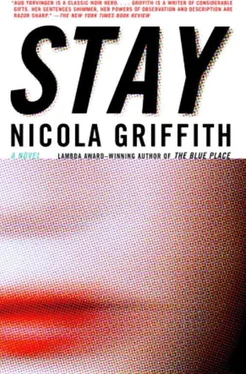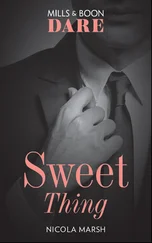Every now and again he stopped and looked in a shop window to check his reflection in the glass, but he never ran his hand through the curl that fell just so over his forehead, or tugged at the waistband of his trousers to look thinner. Odd. He walked for three blocks before turning right on Prince and buying coffee from an espresso stand. His manner with the stand owner was easy and confident. They both smiled. His smile switched off abruptly as soon as he was out of the owner’s sight. Two empty cabs cruised by as he passed the mural at Prince and Greene. He walked on, sipping every now and again, avoiding pedestrians with relaxed, easy steps, frowning at a woman carrying two bags who bumped his laptop as she passed. The frown, too, was gone an instant later. Another empty cab going in his direction. He was walking all the way, then. I walked behind him, on the same side now, still thirty feet away, loose-muscled and relaxed, watching, assessing.
When he turned onto Broadway proper, which seethed with pedestrians, I shortened the distance to fifteen feet. His boots, brown nubuck, either were brand new or lavished with extraordinary care; his jacket was still uncreased; his hair bounced gently and shone whenever the sun poured out from behind the clouds. No rings on his hands, which were strong and well manicured and quite hairless. Half a block from a large store with a checked flag hanging outside, he stopped dead on the sidewalk and just stood there. There didn’t seem to be anything to see except for the people and traffic. I stepped into the doorway of an antique shop until he nodded to himself, and walked on. I was still twenty-five feet behind him when he turned into the store with the flag. I followed him in.
Cheap striplights, huge floor space, a jumble of racks, plain-looking signs advertising jeans, army-navy clothes, and club gear: nothing like the upscale emporiums Tammy said he usually patronized or consulted for. At any other SoHo store I would have waited by the door, but there were several levels here, and probably more than one exit. I’d have to follow him. This was not easy; I couldn’t stay in his blind spot, because I couldn’t predict where his gaze might fall. One minute he’d be walking along slowly, looking at the floor, the next he’d stop and turn and watch the tourists goggling at vinyl fetish clubwear; then he’d go stand in a corner by the sports jackets and look up at the ceiling, at the pillars with their mirrors, at the mannequins in their cargo shorts and caps. After a while I decided he was calculating camera angles and placement, studying pedestrian traffic patterns, gauging penetration zones, and it became obvious that he didn’t see people as people at all, that I could smile and wave at him every time he looked my way, and he wouldn’t notice me. I would be just another data point, part of a flow pattern, a consumer unit. I stayed about twenty feet back and watched.
His face while he worked was empty, removed, like that of an Olympic springboard diver as he sets his toes on the edge, spreads his arms, and begins the bouncing jump. When he stood still, his body canted slightly to the left, with his head tilted to the right in compensation. He kept his hands clasped behind him, like male members of the British royal family, and I doubted—even if he had not had to carry his laptop—that he would ever put them in his pockets. Judging by his posture and musculature, he was not a physical person; there were no laugh or frown lines on his boyish face. A man who lived in his head, or in the heads of others.
Around me, shoppers moved in miniature flocks of four or five, doing a lot of looking and talking, in German and Japanese and Portuguese, but not much buying. No doubt Karp had been called in to remedy that.
He spent hours inside the store, watching, listening, absorbing. I followed him from floor to floor. At some point he decided he was done: his face tightened, then curved in a practiced smile which made his eyes twinkle, and he walked purposefully to the second floor, and across to the far wall, where he talked to a woman behind a counter. She obviously did not respond as quickly as he felt was his due, because he put his bag on the counter, leaned forward, and spoke forcefully, until she picked up the phone. Less than a minute later, a door marked PRIVATE opened, Karp shook hands with a young man wearing jeans and a hundred-dollar haircut, and they went through the door, shutting it behind them. The room was built against a sidewall; it was unlikely that it led to another exit. I settled myself behind a row of mesh T-shirts to wait.
When he emerged half an hour later, he was still smiling, still twinkling—at least until the door closed behind him, when his face smoothed. I followed him onto the street, with its rush-hour traffic of frowning pedestrians and honking cabs, where he stepped behind a lamppost, put his laptop between his feet, and pulled out a phone. I moved closer.
“—about, oh,” he looked at his watch, “an hour? Two? Okay, eight o’clock. Yeah, yeah, or we can order in at my place if that’s what—Sure. We can decide later.” Not a business call.
He went back to his loft, walking briskly. This time I watched from the bar, drinking mineral water. He came out after only ten minutes, minus the laptop, wearing corduroy trousers and a sweater under his leather jacket. I followed him two blocks to Greene Street, and a restaurant and cocktail lounge paneled in dark wood, where he sat at the bar and nodded to one of the bartenders but didn’t speak. I took a table against the wall right behind him where he wouldn’t see me. A margarita appeared on the bar in front of him. He came in here a lot, then. It hadn’t been on the American Express bill. He sipped, smiled appreciatively—the same curving, twinkling smile I’d seen him assume at the store—and said something to the bartender, who laughed. The other bartender, this one a man, came over and said something. They all laughed. Lots of exaggerated head tilting, smiling, hand movements: flirting body language.
I ordered a Heineken.
For the next hour and a half I watched him flirt indiscriminately with men and women, couples and groups and singles, flashing out that smile, hooking them in, dismissing them after a sentence or two when it became clear he could have them if he wanted. Geordie Karp did not add up.
The first eighteen months I worked for the Atlanta police force it was as an ordinary patrol officer. One of the most frequent calls my partner Frank and I’d get would be domestic violence. The abusers came in every size and shape and color, every background and political stripe, but the vast majority had this in common: somewhere inside, they were afraid. The bigger and louder and richer they were, the easier it was to overlook that fear, but in the habitual abuser—cases where a onetime psychosis or injury or other unusual circumstance was not to blame—it was always there. It might be fear of losing control, or of not being loved, of being ridiculed, or separated, or of being less somehow, but you could see it. Something in the way they held themselves, in the way they tried to fast-talk the officers who arrived, even, sometimes, in their misplaced pride.
Geordie Karp did not add up as an abuser. I could see no fear in him; I could see no genuine emotion at all. Everything, the smiles, the flirting, the frowns when he had been bumped into on the street, the peremptory attitude towards the woman behind the counter in the store, was fake: gone the second he no longer needed it. Learned behavior. I went through all the things Tammy had told me: the good sex, the confusing signals—treated as an equal one minute and raped the next—and his rapid, all-too-plausible explanations. There had been no putting Tammy on a pedestal, no overly fast discussion, when they first met, of them marrying or spending their lives together—none of the classic profile pointers of abuse. Tammy had been an experiment, an amusement, one of many, most probably.
Читать дальше












